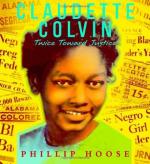
|
| Name: _________________________ | Period: ___________________ |
This test consists of 5 short answer questions, 10 short essay questions, and 1 (of 3) essay topics.
Short Answer Questions
1. What did the first three plaintiffs testify to when Gray presented them?
2. What did the City Lines have to do in response to the boycott?
3. Who was the youngest of the three federal judges hearing Claudette's case?
4. What did people say about Claudette when she left Montgomery?
5. How did Claudette get to court?
Short Essay Questions
1. What did Claudette do about the celebration?
2. What did vow to do when the Supreme Court upheld the court's decision and what happened finally? Where was Claudette on the first day the blacks began to ride the bus again?
3. When did Claudette speak to the students at Booker T. Washington Magnet High School in Montgomery, Alabama? What did Claudette do in 1957?
4. What did Gray do as a second front for the bus boycott?
5. How and when did the bus boycott get started?
6. Why was Parks considered a good figurehead for the bus boycott?
7. How does Claudette get to the court, how many days had the boycott been going when she went to court and how did blacks feel about the court case?
8. What did Claudette do when she returned to Montgomery?
9. Who were the judges on Claudette's court case?
10. Why did Claudette leave school and why did she feel left out of the bus boycott movement?
Essay Topics
Write an essay for ONE of the following topics:
Essay Topic 1
Discuss the following:
1. Why do you think it is important that this book was written? Use examples from the text and your own life to support your answer.
2. Do you think this book did what the author set out to do? Why or why not? Use examples from the text and your own life to support your answer.
3. Explain why you might or might not read another book by this author about another real life person. Use examples from the text and your own life to support your answer.
Essay Topic 2
Claudette was four years old when she found out what happened when blacks acted up against whites. Some white boys came up to her and wanted to see her hands. They touched each other's hands and the boys laughed. When Claudette's mother saw them, she came up to Claudette and slapped her across the face and told her that she's not supposed to touch white people. The white boy's mother agreed. She learned to never touch white people again.
1. Discuss how you think the above incident could affect someone's self-esteem. Use examples from the text and your own life to support your answer.
2. Many southern white women used black women as "nannies" or for child care. Discuss what might be contradictory about allowing black women to care for white children, which would include holding them, bathing them, etc. and black children being told they could not touch white children. Use examples from the text and your own life to support your answer.
3. In the 1960's Grace Haskell dyed her skin and traveled America as a black woman. She was the exact same person under the black skin and yet simply because she was dark her experience of the country and people became different. In view of the incident with Claudette above, discuss the insanity of prejudice on the basis of skin color. You might want to start your discussion about how a white woman who becomes black all of a sudden was not good enough to touch another white person. Use examples from the text and your own life to support your answer.
Essay Topic 3
The segregationists continued to resist changing anything for the boycott. Many singled out Martin Luther King to blame for "stirring up trouble" and the like. He had been attacked several times. Segregationists had also used an obscure anti-boycott law to have many black leaders arrested, including King and Parks.
1. Why do you think the segregationists continued to resist change? Use examples from the text and your own life to support your answer.
2. Why do you think Martin Luther King was singled out by the segregationists? Use examples from the text and your own life to support your answer.
3. When a law is wrong such as the anti-boycott law, do you think people should still obey it? Why or why not? Use examples from the text and your own life to support your answer.
|
This section contains 1,173 words (approx. 4 pages at 300 words per page) |

|




